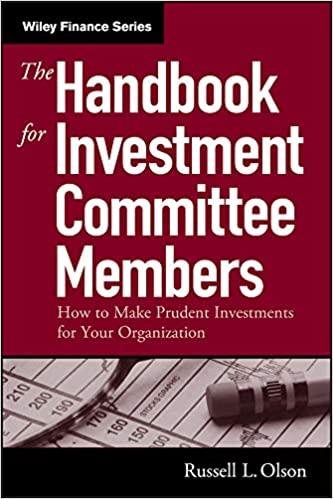Question
Anna just turned 30 today on December 31 st and she is just finishing her first year of work in a new job. She works
Anna just turned 30 today on December 31st and she is just finishing her first year of work in a new job. She works for TVM Inc. and currently earns $40,000 a year. She anticipates that her salary will grow at 3% per year, starting tomorrow on January 1st. She has recently received a $100,000 inheritance in cash. With the goal of funding her retirement at age 65, using both the inheritance and savings from her employment income, Anna is looking at two different investment options.
Option 1: Invest now the $100,000 inheritance in a GIC (Guaranteed Investment Certificate) and hold it until she retires at age 65. The GIC will earn interest of 4% per year (compounded annually) throughout the entire period.
Additionally, starting one year from today Anna will invest 5% of her salary each year and in a mutual fund with an expected rate of return of 6% per year (compounded annually). Annas last payment into the mutual fund will be on her 65th birthday.
Option 2: Anna has the opportunity to upgrade her education by starting a two-year MBA program today for a cost of $40,000 payable today. She would pay the fees for the MBA program out of her inheritance and invest now the remainder in a GIC which would earn 4% per year (compounded annually) and be kept invested until retirement at age 65
While in the MBA program for the next two years, Anna will not save any portion of her income for her retirement. However, she expects that right upon graduation, her new salary will be $60,000 per year growing at 4% per year. This will start in two years from now. Anna will then be able to save 6% of her salary to invest in the mutual fund at a 6% rate of return per year (compounded annually). The savings invested in the mutual fund will start three years from today (at the end of her first post-MBA year) and the last deposit will be on her 65th birthday.
1.) If Anna chooses option 1, how much would both investments total on her 65th birthday, when she retires? Ignore the taxes that may be payable on the investments.
2.) If Anna chooses option 2, how much would both investments total on her 65th birthday, when she retires? Ignore the taxes that may be payable on the investments.
3.) To end up with the highest retirement amount, which option should Anna choose?
NEED HELP WITH QUESTION #3.
Step by Step Solution
There are 3 Steps involved in it
Step: 1

Get Instant Access to Expert-Tailored Solutions
See step-by-step solutions with expert insights and AI powered tools for academic success
Step: 2

Step: 3

Ace Your Homework with AI
Get the answers you need in no time with our AI-driven, step-by-step assistance
Get Started


